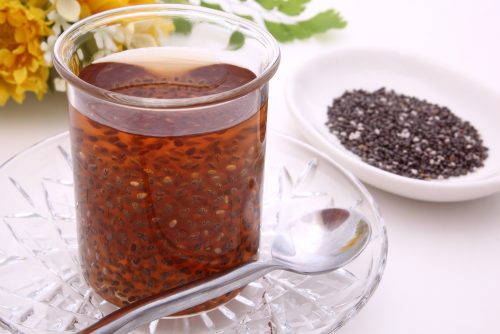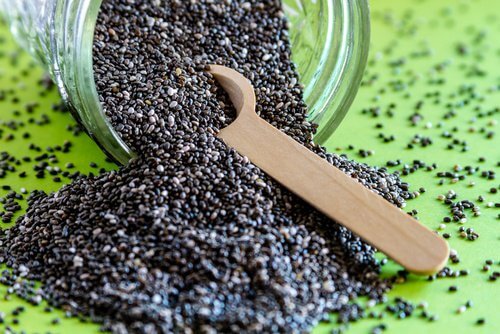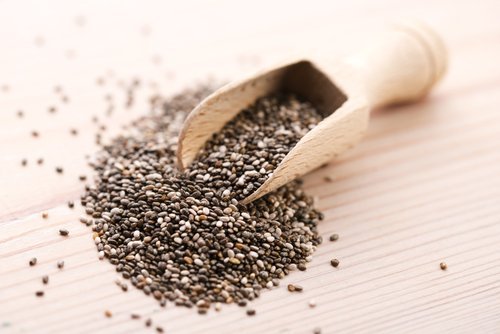7 Amazing Benefits of Chia Seeds

These small, dark, gluten-free, fiber and anti-oxidant rich seeds are all the rage. And with good reason! Chia seeds are great for anyone and everyone, from celebrities and athletes to children.
The word chía is of Mayan origin, and means “strength”. For thousands of years, these seeds have been a dietary staple in Central American countries. Over time, they have gradually been incorporated into all kinds of different cuisine. This is because chia seeds are packed with vitamins, omega-3 fatty acids, and minerals.
Although chia seeds were originally part of the Mayan and Aztec diets, they’ve now expanded throughout the world and are included in all different kinds of recipes, both savory and sweet: fruit smoothies, desserts, breads, salads etc. Their light flavor means they won’t alter the taste of your food, but they can give it a different, slightly crunchy texture.
Nutritional properties

According to the American Society of Nutrition, this super food contains up to 5 times as much calcium as milk, making them an ideal dietary substitute for vegans and those who are lactose intolerant. Chia seeds also:
- Contain more protein than vegetables.
- Are three times richer in iron than spinach
- Have three times as many antioxidants as blueberries (which can help to prevent cell oxidation).
- Provide twice as much potassium as a banana.
- Contain twice as much fiber as oats (which can promote digestion).
See also: 8 reasons to eat more oatmeal
The benefits of chia seeds
1. Help satiate hunger
According to a study by the National Polytechnic Institute of Mexico, chia seeds contain properties which can significantly help to satiate hunger. As such, it’s good to add (at least) a teaspoon of chia seeds to your snacks to stop you from resorting to other, high-calorie options when you get hungry between meals.
When they come into contact with liquid, chia seeds swell up to 10 times their original size in the stomach, helping you to feel full. Of course, by helping to satiate your appetite, they can also promote weight-loss, or help you to maintain a healthy weight.
2. Promote hydration
Are you the kind of person who doesn’t usually drink a lot of fluids during the day? Perhaps you forget or you don’t like to drink water. In this case, it is believed that increasing your intake of water, and supplementing it with chia seeds can promote hydration. However, there are no studies confirming this theory.
3. Reduce joint pain
The omega-3 fatty acids in chia seeds are anti-inflammatory, as shown by this study carried out by the Department of Medicine at the University of Chile. As such, they’re a good option if you suffer from joint pain or if you’re susceptible to injuries in particular areas, such as the knees. According to an investigation by the Adventist University of Plata in Argentina, they’re also good for alleviating discomfort caused by arthritis and osteoarthritis.
4. Protection from pollution
Living in cities can cause plenty of health problems. In addition to stress, toxins and pollution are important factors to take into account. If you add that to tobacco smoke and UVA rays, the consequences can be very serious.
It is believed that chia seeds are able to help protect you from these toxins. However, there is insufficient scientific evidence to support this claim.
5. Chia seeds pack a lot of energy
Have you been feeling very tired lately, with no strength or difficulty concentrating? If so, it’s time you consider adding chia seeds to your diet. They’ll help you become more active from the minute you wake up in the morning.
Because they contain more protein and potassium than most fruits and vegetables, they might give you that dose of energy that you’re missing. Ideal for Monday mornings!
6. Help to increase muscle mass

Another advantage of consuming chia seeds is related to energy. When you work out and want to build more muscle, sometimes you might resort to supplements that aren’t good for your health, or may have negative side effects.
An excellent natural replacement for these supplements are chia seeds, as it’s believed that they increase muscle mass. However, this study, published in the Spanish journal Nutrición Hospitalaria, refutes this fact, believing there is a lack of evidence for such a claim.
In conclusion
To enjoy all the benefits of chia seeds, The Food and Nutrition Board of the National Institute of Medicine, recommends the following daily amounts:
- Men under 58 = 1.3 oz
- Men over 58 = 1.05 oz
- Women under 50 = 0.88 oz
- Women over 50 = 0.75 oz
If you want to incorporate them into your meals, we would recommend soaking them in water for at least half an hour beforehand. This will help to strengthen their natural properties, and will produce chia “milk”, which can be used to enrich other meals and drinks.
To make the chia “milk” add one spoonful of seeds to one glass of water. Once soaked, strain the mixture and drink immediately. As the seeds are generally small in size, it’s not always necessary to strain it – it all depends on personal taste. Give it a try!
All cited sources were thoroughly reviewed by our team to ensure their quality, reliability, currency, and validity. The bibliography of this article was considered reliable and of academic or scientific accuracy.
- Aguilar-Toalá, J. E. & Liceaga, A. M. (2020). Identification of chia seed (Salvia hispanica L.) peptides with enzyme inhibition activity towards skin-aging enzymes. Amino Acids, 52(8), 1149–1159. https://link.springer.com/article/10.1007/s00726-020-02879-4
- Aljumayi, H., Aljumayi, A., Algarni, E., Algheshairy, R. M., Alharbi, H. F., Azhar, W., Bushnaq, T. & Qadhi, A. (2022). The Effect of Chia Seed Extracts against Complete Freund’s Adjuvant-Induced Rheumatoid Arthritis in Rats. Journal of Food Quality, 2022, 3507674. https://www.hindawi.com/journals/jfq/2022/3507674/
- Ashish, Mazumder, A. & Sanjita, D. (2023). Evaluation of Potentiality of Salvia hispanica in the Management of Irritable Bowel Syndrome in Wistar Albino Rats. Indian Journal of Pharmaceutical Education & Research, 57, 353-359. https://web.s.ebscohost.com/abstract?direct=true&profile=ehost&scope=site&authtype=crawler&jrnl=00195464&AN=164074948&h=XivEWBpBUPklj4HXrTg9A%2fuj5Xiyj0sYf8o9TygQ%2bPhmR%2bK9xM3J%2b8vqtWQe5aWAqAsv%2fudZpa%2fbcSFTz3ssFg%3d%3d&crl=c&resultNs=AdminWebAuth&resultLocal=ErrCrlNotAuth&crlhashurl=login.aspx%3fdirect%3dtrue%26profile%3dehost%26scope%3dsite%26authtype%3dcrawler%26jrnl%3d00195464%26AN%3d164074948
- Dickens, B., Sassanpour, M. & Bischoff, E. L. (2023). The Effect of Chia Seeds on High-Density Lipoprotein (HDL) Cholesterol. Cureus, 15(6), e40360. https://pubmed.ncbi.nlm.nih.gov/37456479/
- Harvard T. H. Chan School of Public Health (s.f.). Chia seeds. Consultado el 31 de julio de 2023. https://www.hsph.harvard.edu/nutritionsource/food-features/chia-seeds/
- Imran, M., Salehi, B., Sharifi-Rad, J., Aslam Gondal, T., Saeed, F., Imran, A., Shahbaz, M., Tsouh Fokou, P. V., Umair Arshad, M., Khan, H., Guerreiro, S. G., Martins, N. & Estevinho, L. M. (2019). Kaempferol: A Key Emphasis to Its Anticancer Potential. Molecules, 24(12), 2277. https://www.mdpi.com/1420-3049/24/12/2277
- Jerez, S., Medina, A., Alarcón, G., Sierra, L. & Medina, M. (2021). Chia Seed Oil Intake: Is It Beneficial for Preventing Cardiovascular Risk Factors? Biology and Life Science Forum 8(1), 7. https://www.mdpi.com/2673-9976/8/1/7
- Lestari, Y. N., Farida, E., Amin, N., Afridah, W., Fitriyah, F. K., Sunanto, S. (2021). Chia Seeds (Salvia hispanica L.): Can They Be Used as Ingredients in Making Sports Energy Gel? Gels, 7(4), 267. https://www.mdpi.com/2310-2861/7/4/267
- Montes Chañi, E. M., Pacheco, S. O. S., Martínez, G. A., Freitas, M. R., Ivona, J. G., Ivona, J. A., Craig, W. J., & Pacheco, F. J. (2018). Long-Term Dietary Intake of Chia Seed Is Associated with Increased Bone Mineral Content and Improved Hepatic and Intestinal Morphology in Sprague-Dawley Rats. Nutrients, 10(7), 922. https://www.ncbi.nlm.nih.gov/pmc/articles/PMC6073254/
- Mutar, H. A. & Alsadooni, J. F. K. (2019). Antioxidant and anti-cancer activity of Chia seed extract in breast cancer cell line. Annals of Tropical Medicine and Public Health, 22(08), 173-181. https://hero.epa.gov/hero/index.cfm/reference/details/reference_id/8114084
- Kulczyński, B., Kobus-Cisowska, J., Taczanowski, M., Kmiecik, D., Gramza-Michałowska, A. (2019) The Chemical Composition and Nutritional Value of Chia Seeds—Current State of Knowledge. Nutrients. 11(6):1242.
https://www.mdpi.com/2072-6643/11/6/1242 - Ramachandran, S., Nikitha, J., Gopi, C., Amala, M., & Dhanaraju, M. D. (2020). Effect of Prunus dulcis and Salvia hispenica in the management of polycystic ovary syndrome in Wistar rats. Journal of Taibah University Medical Sciences, 15(2), 122–128. https://www.sciencedirect.com/science/article/pii/S1658361220300299
- Turck, D., Castenmiller, J., De Henauw, S., Ildico Hirsch‐Ernst, K., Kearney, J., Maciuk, A., Mangelsdorf, I., McArdle, H. J., Naska, A., Pelaez, C., Pentieva, K., Siani, A., Thies, F., Tsabouri, S., Vinceti, M., Cubadda, F., Engel, K. H., Frenzel, T., Heinonen, M., … Knutsen, H. K., (2019). Safety of chia seeds (Salvia hispanica L.) as a novel food for extended uses pursuant to Regulation (EU) 2015/2283. EFSA Journal, 17(4), e05657. https://efsa.onlinelibrary.wiley.com/doi/full/10.2903/j.efsa.2019.5657
- Vuksan, V., Jenkins, A. L., Brissette, C., Choleva, L., Jovanovski, E., Gibbs, A. L., Bazinet, R. P., Au-Yeung, F., Zurbau, A., Ho, H. V., Duvnjak, L., Sievenpiper, J. L., Josse, R. G. & Hanna, A. (2017). Salba-chia (Salvia hispanica L.) in the treatment of overweight and obese patients with type 2 diabetes: A double-blind randomized controlled trial. Nutrition, Metabolism and Cardiovascular Diseases, 27(2), 138-146. https://www.sciencedirect.com/science/article/abs/pii/S0939475316303295
- Xingú López, A., González Huerta, A., de la Cruz Torrez, E., Sangerman-Jarquín, D. M., Orozco de Rosas, G. & Rubí Arriaga, M. (2017). Chía (Salvia hispanica L.) situación actual y tendencias futuras. Revista Mexicana de Ciencias Agrícolas, 8(7). https://www.scielo.org.mx/scielo.php?script=sci_arttext&pid=S2007-09342017000701619
This text is provided for informational purposes only and does not replace consultation with a professional. If in doubt, consult your specialist.








